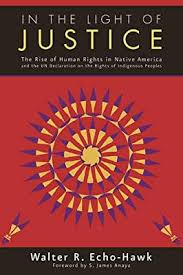The Palmdale City Library, in collaboration with the City of Glendale’s Library, Arts & Culture Department, is presenting the next free virtual public forum on “Inclusion, Diversity, Equity and Anti-racism (IDEA)” at 6:30 p.m., Nov. 5. It will feature author and attorney Walter R. Echo-Hawk who will discuss his book, “In the Courts of the Conqueror: The 10 Worst Indian Law Cases Ever Decided,” in conversation with Autry Museum President and Chief Executive W. Richard West Jr.
“In the Courts of the Conqueror” examines 10 Supreme Court cases that changed the fate of Native Americans, provides the contemporary historical/political context of each case and explains how the decisions have adversely affected the cultural survival of Native people to this day.
Among Echo-Hawk’s most important contributions to Native American rights was his involvement in the development and passage of The Native American Graves Protection and Repatriation Act (NAGPRA), a Federal law passed in 1990.

His books include “In the Light of Justice: The Rise of Human Rights in Native America & the UN Declaration of the Rights of Indigenous Peoples” and “The Sea of Grass: A Family Tale from the American Heartland,” an historical novel in the manner of Alex Haley’s “Roots,” in which Echo-Hawk chronicles the lives and times of ten generations of his Pawnee Indian family in the Central Plains of America.
Echo-Hawk is a tribal leader of the Pawnee Nation of Oklahoma, lawyer, tribal judge, scholar, author, and activist. His legal experience includes cases involving Native American religious freedom, prisoner rights, water rights, treaty rights and reburial\repatriation rights.
He is admitted to practice law before the United States Supreme Court, Colorado Supreme Court, Oklahoma Supreme Court, US Courts of Appeals for the Eighth, Ninth, District of Columbia, and Tenth Circuits, and a host of federal District Courts.
W. Richard West Jr. is a citizen of the Cheyenne and Arapaho tribes and has led the Autry Museum since 2013. Previously, he was founding director of the Smithsonian’s National Museum of the American Indian in Washington, D.C., and worked nearly 20 years as a Native American rights attorney.
The series will also examine the one-year anniversary of the 2020 racial justice protests and 100-year anniversary of the Tulsa Race Massacre. The series will include virtual lectures, exhibits, and online programming from authors, curators, and historians. The series is sponsored by the City of Glendale Arts and Culture Commission with funding from the City of Glendale’s Urban Art Fund.
Registration for this free event is available at https://glac.info/BeTheChange
For more information, call the Palmdale City Library at 661-267-5600 or TDD 267-5167, or visit www.cityofpalmdale.org/library




